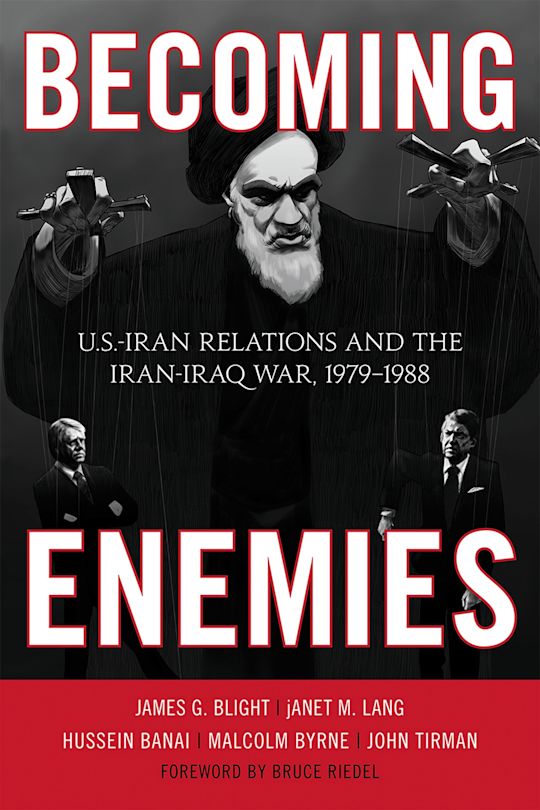Becoming Enemies
U.S.-Iran Relations and the Iran-Iraq War, 1979–1988
Becoming Enemies
U.S.-Iran Relations and the Iran-Iraq War, 1979–1988
For information on how we process your data, read our Privacy Policy
Thank you. We will email you when this book is available to order
You must sign in to add this item to your wishlist. Please sign in or create an account
Description
Becoming Enemies brings the unique methods of critical oral history, developed to study flashpoints from the Cold War such as the Cuban Missile Crisis, to understand U.S. and Iranian relations from the fall of the Shah in 1978 through the Iranian hostage crisis and the Iran-Iraq war. Scholars and former officials involved with U.S. and UN policy take a fresh look at U.S and Iranian relations during this time, with special emphasis on the U.S. role in the Iran-Iraq War. With its remarkable declassified documentation and oral testimony that bear directly on questions of U.S. policymaking with regard to the Iran-Iraq War, Becoming Enemies reveals much that was previously unknown about U.S. policy before, during, and after the war. They go beyond mere reportage to offer lessons regarding fundamental foreign policy challenges to the U.S. that transcend time and place.
Table of Contents
Part I: The U.S. and Iran: How “the Enemy Has Become Our Masterpiece.”
Prologue: Kierkegaard in the Desert: A Reader's Guide to Becoming Enemies.
Dramatis Personae: Who's Who at the Musgrove Conference.
Chapter One: How It Came to This: The Evolution of Dueling U.S. and Iranian Narratives.
Part II: The Musgrove Conference: A Critical Oral History of the Origins of U.S.-Iranian Enmity.
Chapter Two: The U.S. Confronts The Islamic Republic: The Origins of Enmity, 1979-1982.
Chapter Three: The U.S. Tilt Toward Iraq: A Strategy for Avoiding a “Middle Eastern Armageddon.”
Chapter Four: “A World-Class Rogues' Gallery of Liars and Crooks”: The Iran-Contra Affair.
Chapter Five: “This Huge Crescendo of Pressures”: Iraqi Resurgence in 1988 and Iranian Preparation for War with the U.S.
Chapter Six: Khomeini Drinks the “Hemlock”: How the United Nations Facilitated the End of the War.
Part III: Revelations, Perspectives and Interpretations.
Chapter Seven: Missed Opportunities? The
Product details
| Published | May 03 2012 |
|---|---|
| Format | Ebook (Epub & Mobi) |
| Edition | 1st |
| Extent | 408 |
| ISBN | 9781442208322 |
| Imprint | Rowman & Littlefield |
| Publisher | Bloomsbury Publishing |
About the contributors
Reviews
-
By applying an innovative methodology ("critical oral history"), by engaging some of the most authoritative voices on the subject matter in a well-informed, candid, and insightful dialogue, and through their own trenchant analyses, the authors of this groundbreaking work provide a fresh perspective on the mindsets, misperceptions, and misguided policies by Iran, Iraq, and the United States, that helped start and prolong what became one of the bloodiest regional wars in the latter half of the twentieth century. For policymakers, scholars, and students pondering the causes of the enduring enmities and mistrust between Iran and the United States today, this book is a must read.
Ali Banuazizi, Boston College and past president, Middle East Studies Association
-
An elegantly written treasure trove of fascinating, forgotten, and previously unrevealed history. For those seeking to understand the roots of modern enmity between the U.S. and Iran, Becoming Enemies is a truly unique and wonderful resource.
Karim Sadjadpour, Carnegie Endowment
-
A fascinating, eye-opening book about the players and politics of the Iran-Iraq war and the war's domestic and foreign policy repercussions whose effects continue to resonate today.
Haleh Esfandiari, the Woodrow Wilson International Center for Scholars
-
Becoming Enemies provides a unique and unrivalled insight into the framing of U.S. policy toward the Iran-Iraq war and the roots of the contemporary American-Iranian antagonism. The innovative approach of critical oral history yields penetrating insights into how policy-makers and officials understood events at the time and in hindsight. This book is essential reading for anyone who wants to understand recent U.S. policy in the Middle East.
Nigel J. Ashton, London School of Economics and Political Science
-
[This] book is a very useful source on the Iran–Iraq war, adding a wealth of useful material that was not available before. One of its central themes – that of ‘missed opportunities’ in US–Iranian relations – is also well-taken and critical to an understanding of the topic.
European Political Science
-
Too often, Americans seem eager to do things rather than to understand things. For those who wish to understand, this book offers invaluable insights about the world's most dysfunctional relationship. By explaining a key episode in the long conflict between Iran and the United States, it presents invaluable insights. Whether Americans are willing to consider them could make the difference between war and peace.
Stephen Kinzer, author of Crescent and Star: Turkey Between Two Worlds

ONLINE RESOURCES
Bloomsbury Collections
This book is available on Bloomsbury Collections where your library has access.



































